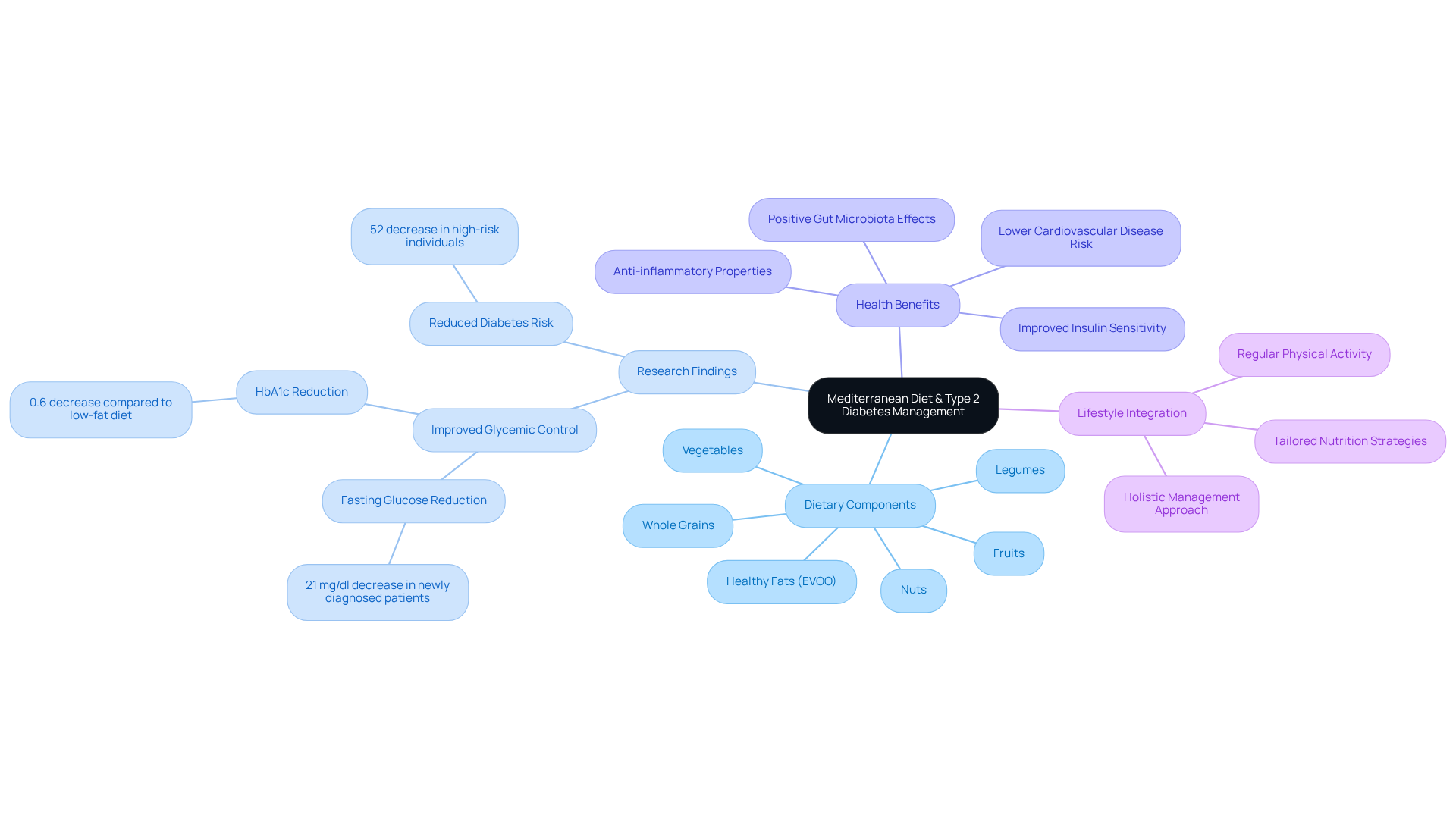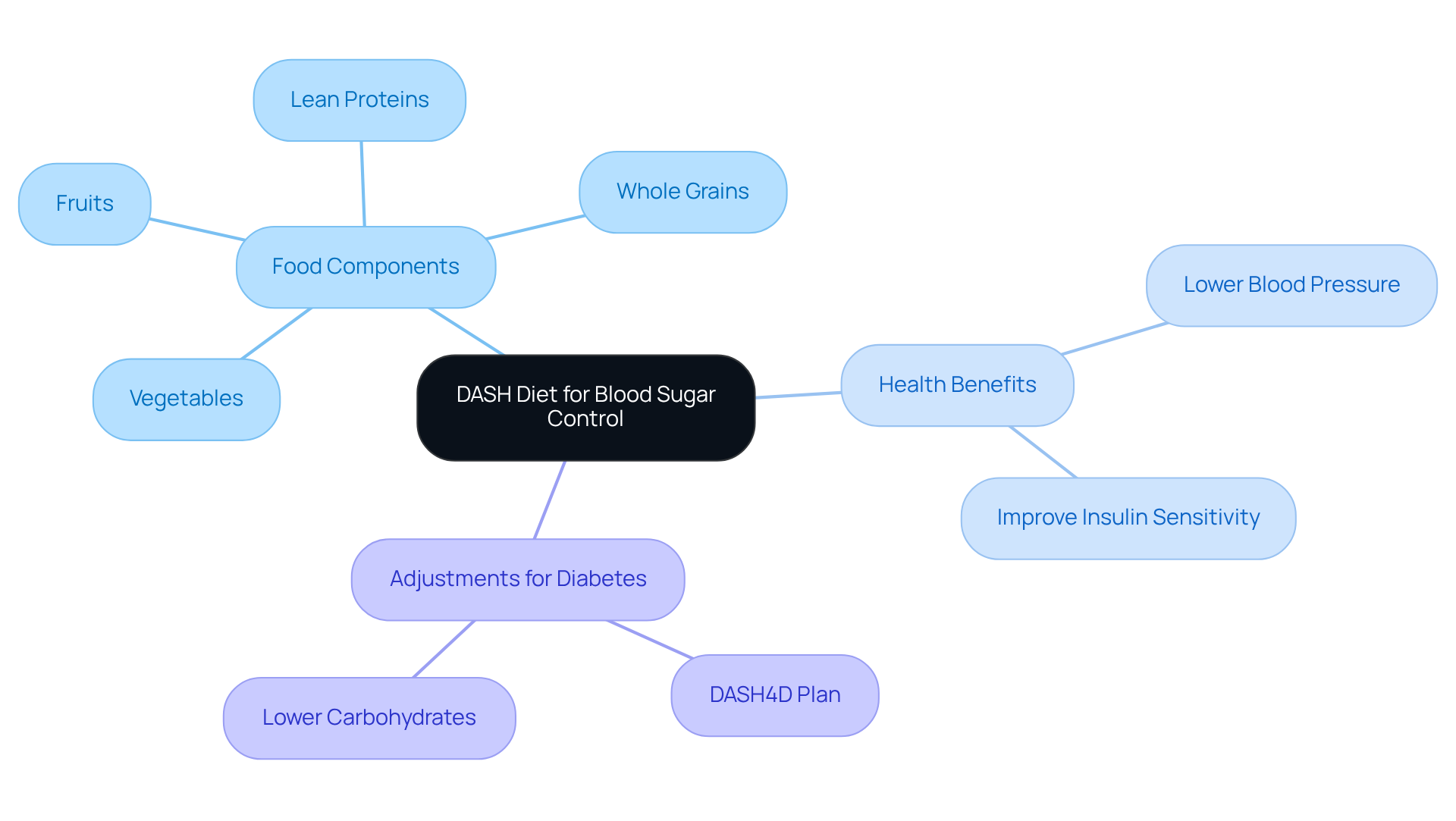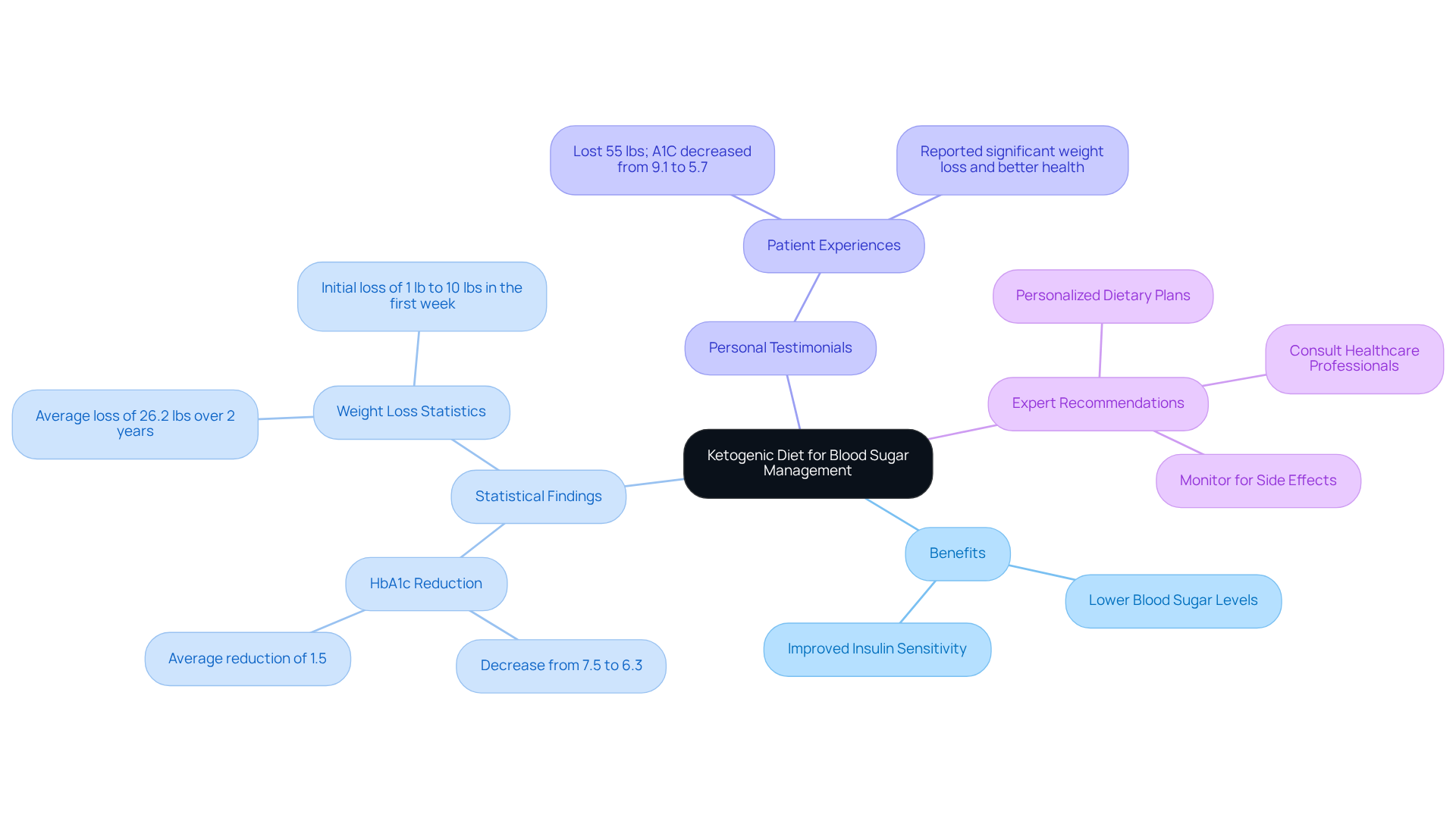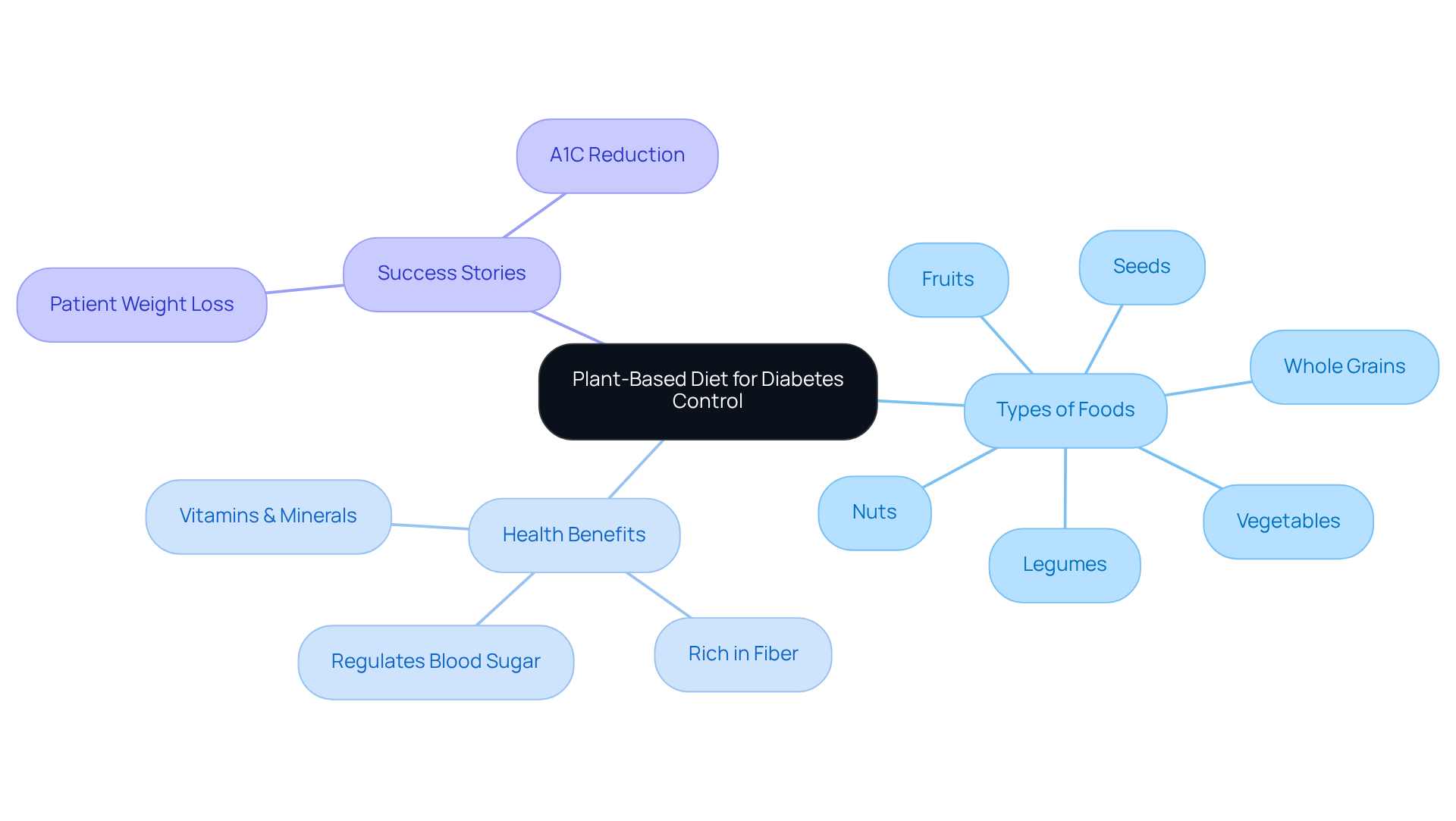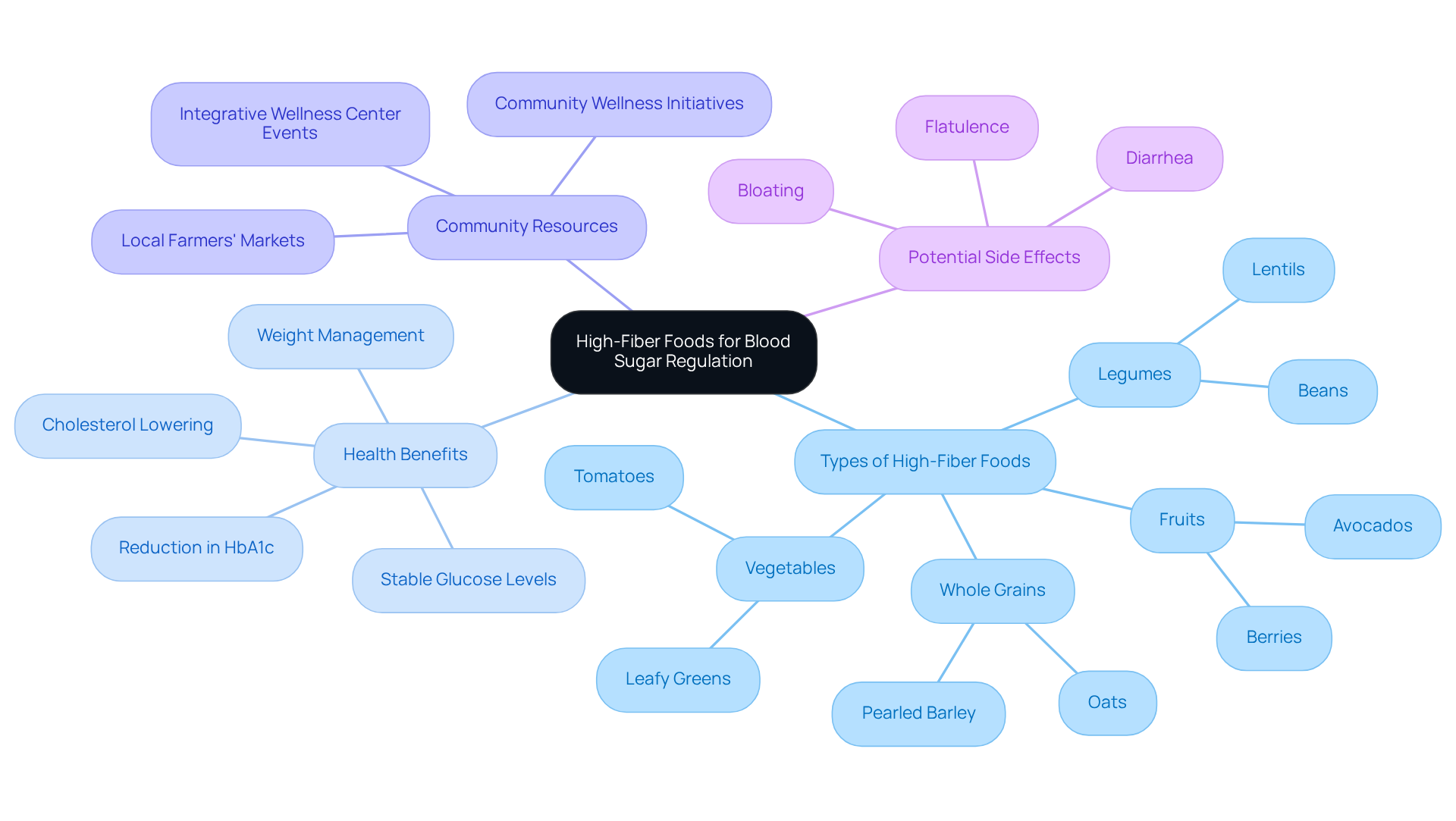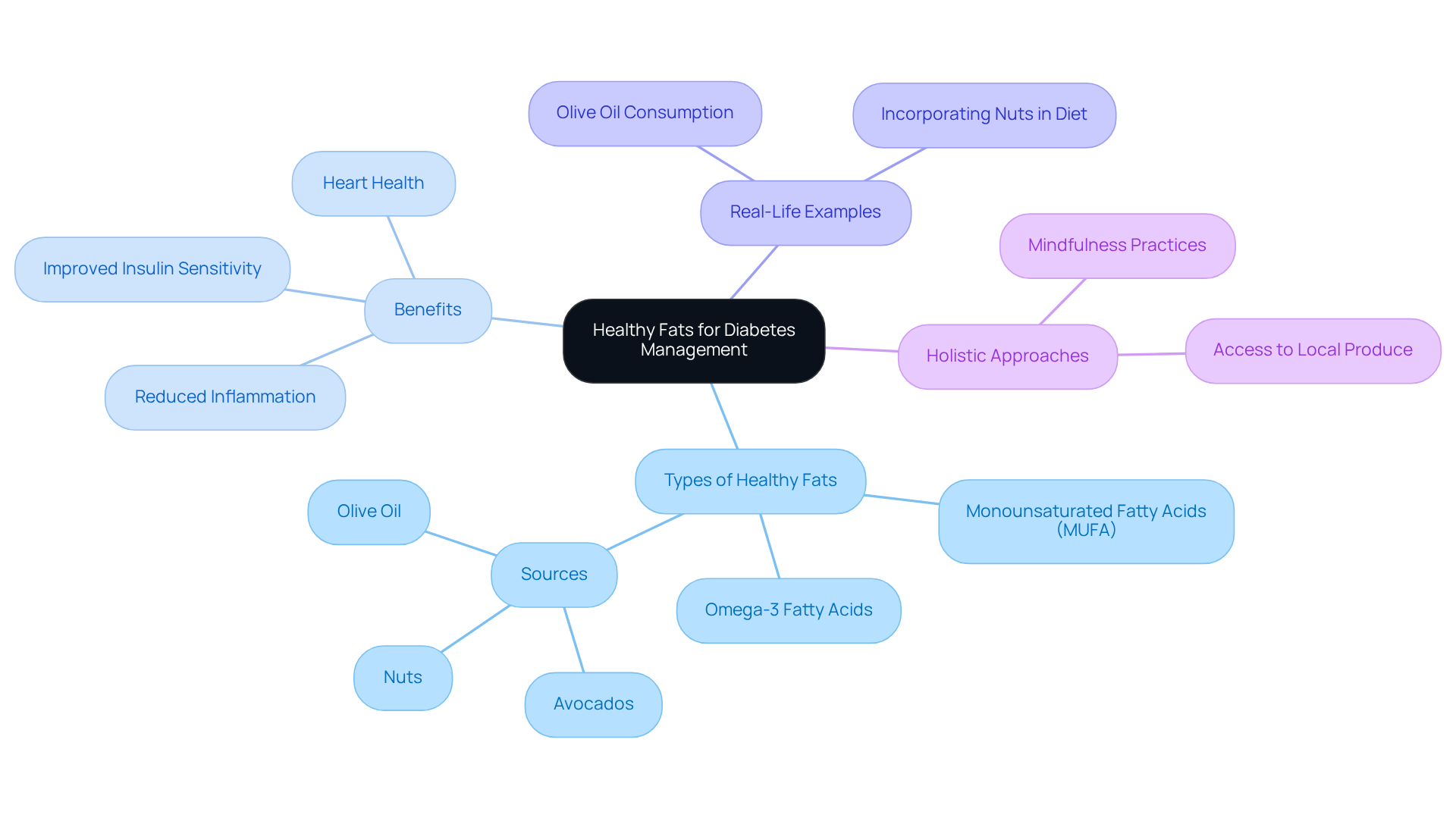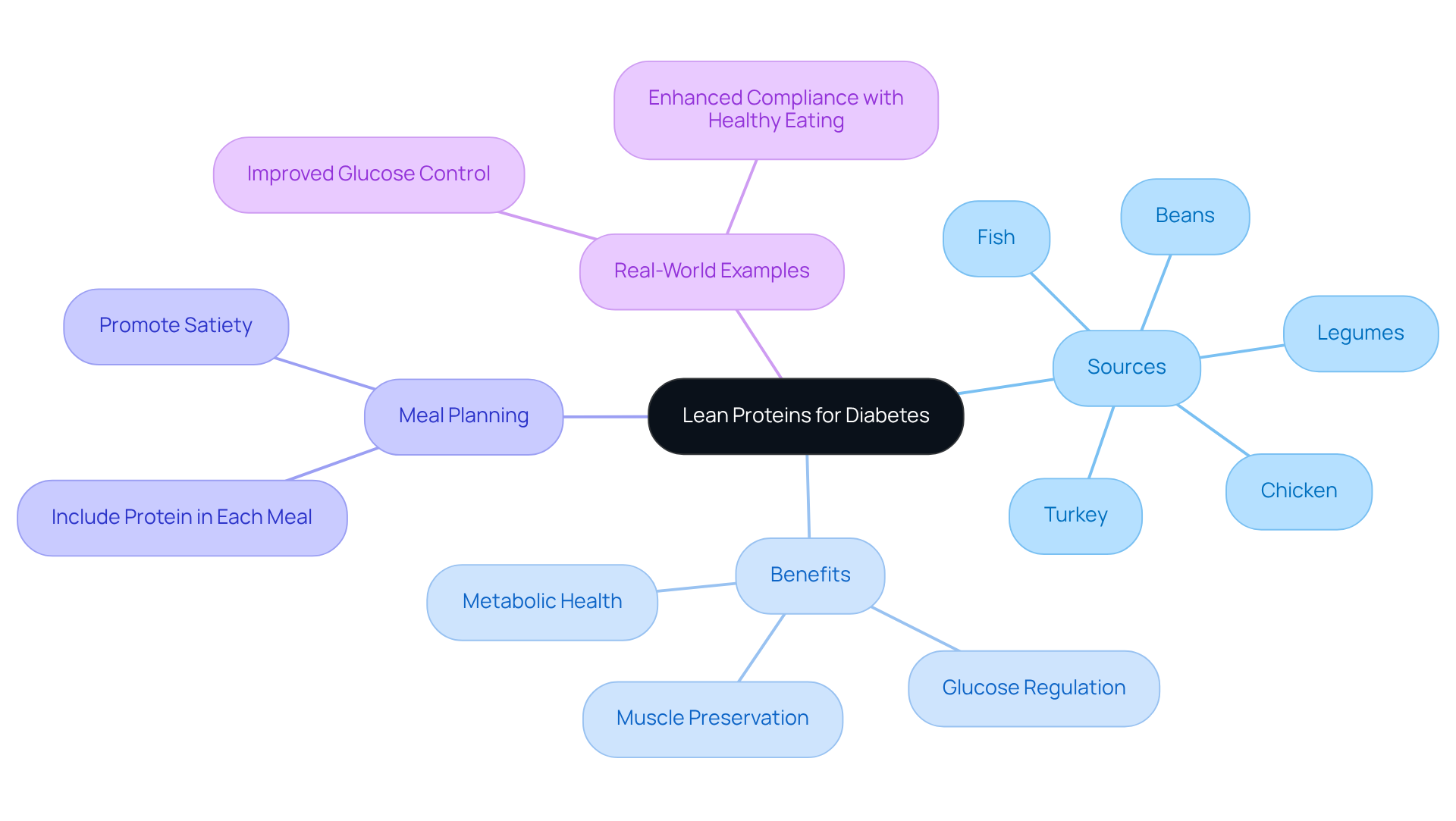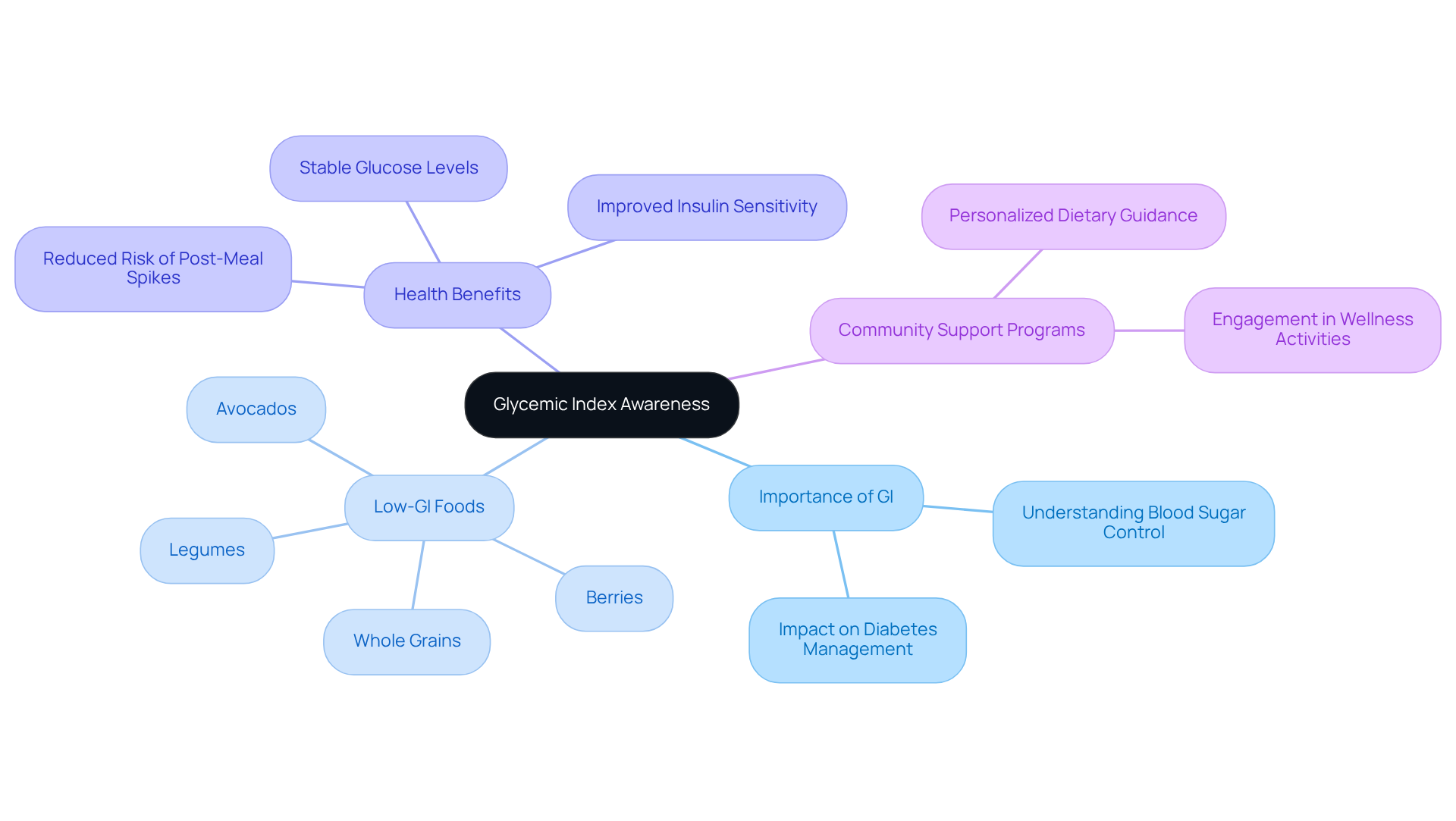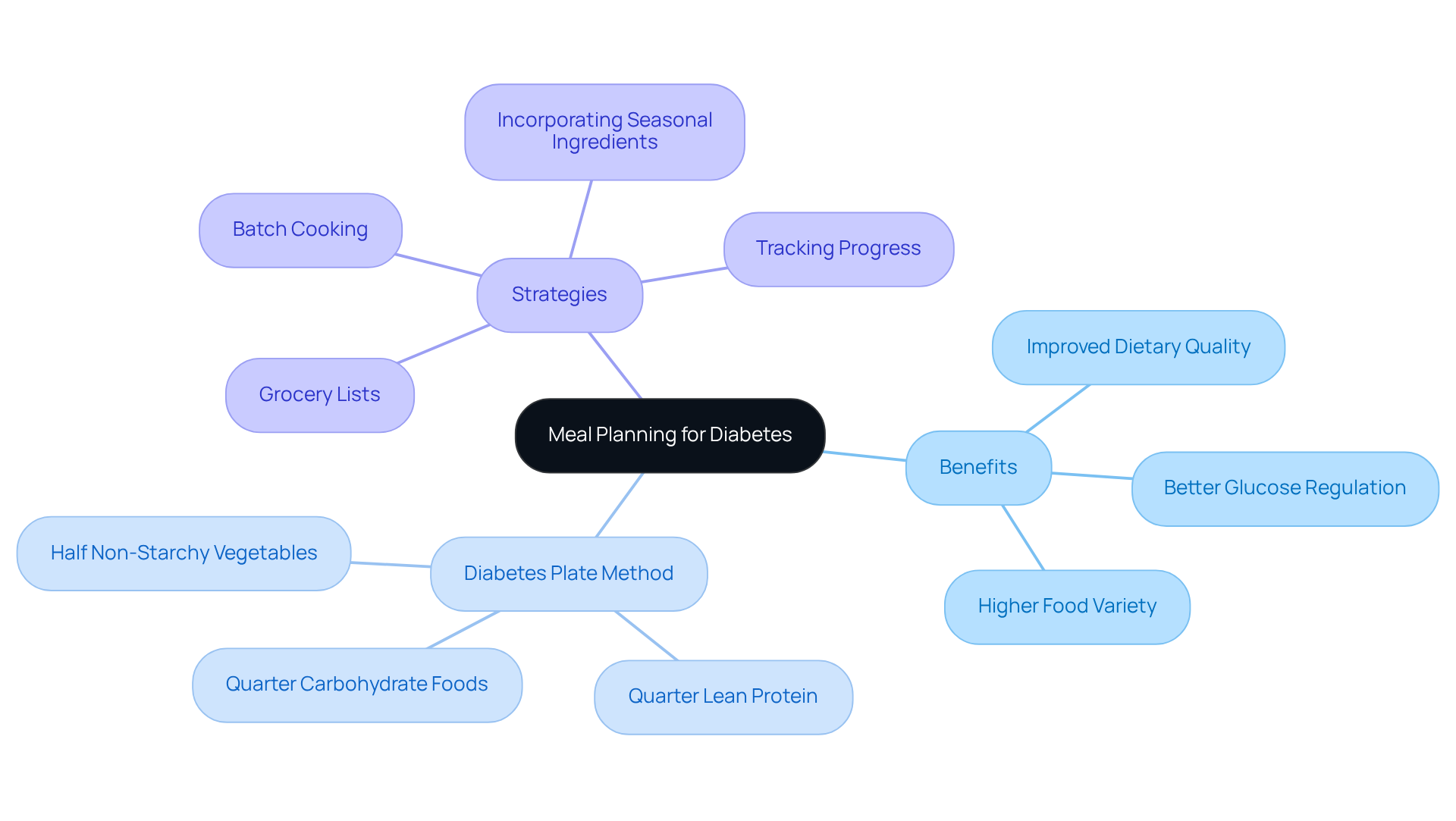Overview
The article titled “10 Essential Diabetes Type 2 Foods for Effective Blood Sugar Control” seeks to provide support for individuals navigating the challenges of managing blood sugar levels with type 2 diabetes. It’s important to recognize that many face daily struggles, and this piece highlights key foods that can make a difference in their journey. By incorporating a variety of nutrient-rich options—like those found in the Mediterranean, DASH, and plant-based diets—individuals can improve their glycemic control and overall health. These diets have shown promising effects on insulin sensitivity and metabolic regulation, offering hope and practical solutions.
Many patients find that making small, manageable changes to their diet can lead to significant improvements. This article emphasizes the importance of variety and balance, encouraging readers to explore these nutritious foods. By fostering a compassionate understanding of their needs, we aim to guide them toward healthier choices that resonate with their lifestyles. Ultimately, the goal is to empower individuals to take charge of their health and embrace a more vibrant life.
Introduction
Navigating the complexities of managing type 2 diabetes can often feel overwhelming. It’s important to recognize that making the right dietary choices is a significant part of this journey. However, understanding the crucial role of specific foods in blood sugar control presents a powerful opportunity for individuals seeking to improve their health. This article delves into ten essential foods that not only support effective blood sugar management but also enhance overall well-being.
Many patients find that with so many options available, discerning which foods truly make a difference in stabilizing glucose levels can be challenging. Together, we can explore these choices and foster a healthier lifestyle.
Integrative Wellness Center: 30-Day Diabetes Reset Program for Lasting Health Transformation
Are you struggling to manage your diabetes? The 30-Day Diabetes Reset Program at the Integrative Wellness Center offers a compassionate, clinically validated initiative designed to empower you with the tools and knowledge necessary to transform your health. This groundbreaking program emphasizes dietary changes, particularly diabetes type 2 foods, along with lifestyle modifications and educational resources that enable you to take control of your diabetes management.
Many patients find that learning about personalized nutrition plans, effective exercise strategies, and stress management techniques—including mindfulness and relaxation practices—tailored to your unique needs can make a significant difference. Dr. Jason Shumard, D.C., with nearly 20 years of experience in functional medicine, leads this program, ensuring that you receive expert guidance throughout your journey.
This comprehensive approach fosters a supportive environment for lasting health transformation, helping you achieve stable glucose levels and renewed energy. Hear from our patients about their success stories and how this program has changed their lives. It’s important to recognize that you’re not alone in this journey; together, we can create a healthier future.
Mediterranean Diet: A Heart-Healthy Approach to Managing Type 2 Diabetes
If you’re struggling with blood sugar management, you’re not alone. Many individuals face challenges when it comes to maintaining healthy levels, and it’s important to recognize that making informed choices about diabetes type 2 foods can play a significant role in this journey. The Mediterranean eating plan offers a nurturing approach, characterized by an abundance of whole grains, fruits, vegetables, legumes, nuts, and healthy fats, particularly extra-virgin olive oil. This dietary pattern not only provides essential fiber and antioxidants but also promotes improved insulin sensitivity and lower blood sugar levels.
Recent studies have shown that following the Mediterranean eating pattern can significantly improve glycemic control. For instance, a randomized controlled study involving 215 newly diagnosed individuals with high blood sugar revealed a reduction in fasting glucose by 21 mg/dl and a decrease in HbA1c by 0.6% compared to a low-fat eating plan. Additionally, the PREDIMED study discovered that participants adhering to a Mediterranean eating pattern experienced a 52% decrease in the occurrence of high blood sugar conditions among high-risk individuals.
It’s also heartening to know that this eating pattern positively affects gut microbiota composition, which is essential for metabolic health. By assisting in decreasing gut dysbiosis associated with type 2 conditions, the Mediterranean diet offers further benefits. Its anti-inflammatory and antioxidant qualities enhance its efficacy in managing blood sugar levels and lowering the risk of cardiovascular diseases. Research suggests that greater compliance with diabetes type 2 foods is linked to a 19-23% lower risk of developing sugar intolerance.
These findings highlight the effectiveness of diabetes type 2 foods within the Mediterranean diet for managing type 2 conditions and reducing the risk of cardiovascular diseases, making it a highly recommended choice for individuals aiming to control their blood sugar levels. At Integrative Wellness Center, Dr. Jason Shumard emphasizes the importance of tailored nutrition strategies as part of a comprehensive approach to managing blood sugar. Integrating regular physical activity into this lifestyle can further enhance its advantages, offering a holistic method for effective management of blood sugar levels. Remember, you’re not alone in this journey, and there are supportive strategies available to help you thrive.
DASH Diet: Effective Dietary Strategy for Blood Sugar Control
The DASH (Dietary Approaches to Stop Hypertension) plan is thoughtfully designed to help reduce sodium intake while encouraging the consumption of nourishing fruits, vibrant vegetables, whole grains, and lean proteins. This dietary approach has shown considerable benefits for individuals with type 2 conditions, such as lowering blood pressure and improving insulin sensitivity. It’s important to recognize that recent research highlights the adjusted DASH4D meal plan, which features fewer carbohydrates and more unsaturated fats, effectively lowering average glucose levels by 11 mg/dL compared to conventional meal plans. Many patients find that following this nutritional plan leads to an increase of about 75 minutes daily in the ideal glucose range, demonstrating its practical efficacy in managing blood sugar levels.
Including nutrient-rich foods while reducing processed choices is essential for maintaining stable glucose levels. The DASH plan not only supports blood sugar management but also enhances overall well-being, making it a beneficial approach for those incorporating diabetes type 2 foods into their diet. Nutritionists emphasize that the DASH plan’s focus on whole foods and diabetes type 2 foods can lead to improved health outcomes, reinforcing its importance as a foundation in nutritional management for type 2 conditions. By embracing this approach, you can take meaningful steps toward a healthier lifestyle.
Ketogenic Diet: Low-Carb Solution for Blood Sugar Management
The ketogenic eating plan, characterized by high-fat and low-carbohydrate intake, promotes a metabolic shift that encourages the body to utilize fat for energy instead of carbohydrates. This dietary approach focusing on diabetes type 2 foods has been shown to significantly lower blood sugar levels and enhance insulin sensitivity, making it particularly beneficial for individuals with type 2 diabetes.
It’s important to recognize that many people struggle with managing their blood sugar, and research findings support these claims. Studies indicate that participants on a ketogenic eating plan experienced notable reductions in glycated hemoglobin (HbA1c) levels, with decreases of up to 1.5% over several months. For example, one study indicated a decrease in HbA1c from 7.5% to 6.3% among overweight diabetic individuals following a low-carbohydrate ketogenic eating plan for 16 weeks.
Real-world examples further demonstrate the effectiveness of this nutritional plan. Numerous people, including those who have taken part in Dr. Jason Shumard’s 30-Day Diabetes Reset program, report significant weight loss—averaging approximately 26.2 pounds over two years—alongside enhanced glucose management. One patient shared, “I lost 55 lbs. My A1C started at 9.1 after 8 months; it is now 5.7.” Many patients find that their journey towards better health is not just about numbers but about feeling better overall.
Furthermore, a meta-analysis showed that individuals adhering to a ketogenic eating plan had a notable decrease in the necessity for diabetes medications, with 95.2% of participants experiencing either a removal or reduction in their medication needs.
Healthcare providers, including Dr. Shumard, emphasize the importance of personalized dietary plans. Experts observe that while the ketogenic approach can provide significant advantages for blood sugar management, it is essential for individuals to seek advice from healthcare professionals prior to implementing drastic dietary modifications. This guarantees that the nutrition plan aligns with their health objectives and reduces potential risks, such as nutrient deficiencies or negative effects like the ‘keto flu.’ One patient commented, “I felt significantly improved, but I had to be cautious about how I shifted into this meal plan.”
Overall, the ketogenic approach presents a promising option for managing type 2 diabetes by incorporating diabetes type 2 foods, but it requires careful consideration and professional guidance. Remember, taking the first step towards a healthier lifestyle can be daunting, but with the right support, it can lead to remarkable changes.
Plant-Based Diet: Nutrient-Rich Choices for Diabetes Control
A plant-based approach emphasizes whole, minimally processed foods, including diabetes type 2 foods like fruits, vegetables, whole grains, legumes, nuts, and seeds. This eating plan includes diabetes type 2 foods that are not just about nutrition; it’s rich in fiber, vitamins, and minerals, which can help regulate blood sugar levels and enhance overall health.
It’s important to recognize that research has indicated that individuals adhering to a plant-based diet, which includes diabetes type 2 foods, might achieve improved glycemic regulation and a reduced risk of developing type 2 diabetes. For instance, one patient in Dr. Jason Shumard’s 30-Day Diabetes Reset program shared their journey of losing 55 lbs and reducing their A1C from 9.1 to 5.7 after adopting this dietary approach.
Many patients find that including these nutrient-dense diabetes type 2 foods in their daily meals is a crucial aspect of the program. This change has transformed many lives, reversing type 2 conditions and fostering holistic health. The success stories from patients who have embraced this dietary approach highlight the effectiveness of functional medicine strategies in managing blood sugar levels and enhancing overall well-being.
Have you considered how a shift in your diet could impact your health? You are not alone in this journey, and there are supportive options available to help you thrive.
High-Fiber Foods: Essential for Blood Sugar Regulation
High-fiber foods, such as whole grains, legumes, fruits, and vegetables, are vital allies in managing glucose levels for those relying on diabetes type 2 foods. It’s important to recognize that fiber plays a significant role by slowing the digestion and absorption of carbohydrates, which leads to more stable glucose levels. Many patients find that increasing their dietary fiber intake can result in meaningful reductions in HbA1c, with meta-analyses reporting decreases ranging from 0.21% to 0.52%. This modest yet clinically significant improvement highlights the potential of fiber in enhancing long-term glycemic control.
Incorporating a variety of high-fiber diabetes type 2 foods into your daily meals not only helps manage glucose levels but also decreases the chances of complications related to diabetes. Foods like oats, beans, lentils, and fruits such as berries are excellent sources of dietary fiber and are considered diabetes type 2 foods. For instance, did you know that a cup of pearled barley provides about 6 grams of fiber? That’s significantly more than the less than 2 grams found in white rice. The American Diabetes Association encourages a diverse intake of diabetes type 2 foods that are rich in fiber due to their positive effects on blood glucose levels.
In San Marcos, CA, local farmers’ markets are a treasure trove of fresh, high-fiber produce, including avocados, tomatoes, and leafy greens, which can be easily incorporated into your meals. Many patients benefit from participating in community wellness initiatives that provide tools and support for effectively managing blood sugar levels. Moreover, consider joining us for our upcoming events at the Integrative Wellness Center, where you can receive a complimentary copy of Dr. Jason Shumard’s book, filled with insights on managing health through nutrition and lifestyle changes.
Nutritionists emphasize the importance of fiber in blood sugar management, noting that a fiber-rich meal plan can promote fullness, aid in weight control, and lower cholesterol levels. Since individuals with blood sugar challenges often face increased risks for heart disease, the cholesterol-reducing benefits of soluble fibers—those that bind to cholesterol in the digestive system—further enhance the health advantages of fiber-rich diets. However, it’s essential to remember that increasing fiber intake may lead to minor side effects like flatulence and bloating. By prioritizing high-fiber foods and utilizing local resources, you can take proactive steps toward achieving better health outcomes and an improved quality of life.
Healthy Fats: Supporting Heart Health and Diabetes Management
Healthy fats, such as those found in avocados, nuts, seeds, and olive oil, are essential allies in managing type 2 diabetes. They enhance insulin sensitivity and promote heart health, which is crucial for your well-being. In San Marcos, CA, where local produce is abundant, incorporating these healthy fats into your meals can be both delicious and beneficial. Many individuals find that nutrition plans rich in monounsaturated fatty acids (MUFA) significantly improve their insulin sensitivity compared to those high in saturated fats. For instance, one study discovered that substituting saturated fats with MUFA led to a notable decrease in body weight and fat mass, highlighting the positive impact of healthy fats on blood sugar management.
Nutritionists emphasize the importance of including healthy fats in meal plans for those managing blood sugar. These fats not only help reduce inflammation but also lower the risk of cardiovascular complications, which are common among individuals with diabetes. A meta-analysis revealed that adhering to a Mediterranean eating pattern, known for its healthy fats, is associated with improved insulin sensitivity and lower cholesterol levels.
It’s important to recognize that a nutrition plan rich in omega-3 fatty acids, found in oily fish and flaxseeds, can further enhance insulin sensitivity and reduce systemic inflammation. Research indicates that individuals following a regimen high in MUFA often experience better metabolic outcomes, including improved glucose regulation.
Real-life examples can illustrate the benefits of healthy fats. Individuals who consistently incorporate olive oil into their meals often report better glucose levels and overall metabolic health. Additionally, a controlled feeding trial showed that meals enriched with MUFA resulted in higher fat oxidation rates, indicating better metabolic responses compared to those high in saturated fats.
Including healthy fats in your daily meals not only supports blood sugar management but also enhances overall well-being, making them vital diabetes type 2 foods in a diabetes-friendly eating plan. As specialists suggest, “A regimen rich in MUFA will likely lead to improvements in insulin resistance along with fat and weight reduction compared to plans richer in long-chain saturated fats.” Embracing local resources, such as farmers’ markets in San Marcos, can further enhance your access to these nutritious options. Moreover, incorporating stress management strategies, like mindfulness practices, can amplify the benefits of healthy fats, establishing a holistic approach to managing your condition.
Lean Proteins: Building Blocks for a Healthy Diabetes Diet
Incorporating lean proteins such as chicken, turkey, fish, beans, and legumes is vital for a balanced diet, especially for individuals managing blood sugar. These protein sources not only help preserve muscle mass but also promote metabolic health and play a significant role in glucose regulation. It’s important to recognize that studies show protein consumption can stabilize glucose levels, making it a crucial element of meal planning with diabetes type 2 foods. For instance, including a source of lean protein in each meal can promote satiety, helping to manage hunger and reduce the likelihood of overeating.
Many patients find that a meal plan abundant in lean proteins can avert rapid increases in glucose levels after eating, thus assisting in overall glycemic management. Real-world examples reveal that individuals who regularly incorporate lean proteins into their diets report better glucose control and enhanced compliance with healthy eating plans. Current studies further support these findings, highlighting the importance of protein in mitigating the risks associated with diabetes and enhancing overall health outcomes. Remember, you are not alone in this journey, and small changes can lead to significant improvements in your health and well-being.
Glycemic Index Awareness: Making Smart Food Choices
Understanding the impact of carbohydrate-containing foods on our glucose levels is crucial, especially for those navigating the challenges of diabetes. The glycemic index (GI) helps us see which foods can cause quick spikes in glucose and which can be more gentle on our bodies. Choosing low-GI foods, such as whole grains, legumes, and non-starchy vegetables, can lead to slower digestion and more stable glucose levels. This is particularly important for individuals with type 2 diabetes, as it can help improve overall health and reduce the risk of post-meal spikes.
In San Marcos, CA, local farmers’ markets are a treasure trove of fresh, seasonal produce that not only nourishes the body but also includes a variety of diabetes type 2 foods. Imagine incorporating avocados, berries, and leafy greens into your meals—these diabetes type 2 foods are not just delicious; they also help boost fiber intake, which is essential for managing glucose levels effectively. It’s important to recognize that small changes can make a significant difference in your health journey.
Additionally, many patients find that engaging in community wellness programs provides personalized guidance and support. These programs empower individuals to make informed dietary choices that resonate with their health goals. Have you considered exploring such opportunities? They can be a wonderful way to connect with others who share similar experiences and to gain insights that are tailored to your needs.
Meal Planning: Key to Consistent Blood Sugar Control
Meal planning is an essential strategy for effectively managing diabetes type 2 foods. It’s important to recognize that by organizing diabetes type 2 foods in advance, you can create balanced meal options that include the right portions of carbohydrates, proteins, and fats. The Diabetes Plate method is a practical tool that suggests filling half of a 9-inch plate with non-starchy vegetables, one quarter with lean protein, and the remaining quarter with diabetes type 2 foods that are high in carbohydrates. This visual approach simplifies meal planning for diabetes type 2 foods, helping to maintain consistent glucose levels and promote healthier eating habits.
Many patients find that meal planning with diabetes type 2 foods positively impacts their dietary quality and glucose regulation. Studies show that individuals who engage in meal planning are more likely to adhere to nutritional guidelines and enjoy a wider variety of foods. For instance, participants in a recent study shared that meal planners had higher food variety scores and were less prone to weight-related issues.
Dietitians emphasize the importance of understanding your personal health needs and preferences when planning meals that include diabetes type 2 foods. They recommend strategies such as:
- Preparing meals in batches
- Using grocery lists
- Incorporating seasonal ingredients
to enhance both nutrition and enjoyment. Real-world examples demonstrate how people have successfully implemented these strategies, leading to better blood sugar management and improved overall well-being.
Incorporating tracking methods, like using fitness apps or journals, can further enhance your meal planning efforts. Setting specific goals, such as aiming for a certain number of steps each day or planning meals a week in advance, can provide motivation and accountability. By prioritizing meal planning and tracking your progress, you can take proactive steps toward better health, ultimately reducing reliance on medications and enhancing your quality of life.
Conclusion
Incorporating the right foods into your diet is crucial for effectively managing type 2 diabetes. It’s important to recognize that emphasizing a variety of diabetes-friendly options—such as those found in the Mediterranean, DASH, ketogenic, and plant-based diets—can significantly improve blood sugar control and overall health. These dietary patterns not only provide essential nutrients but also promote stable glucose levels, making them vital for anyone navigating the challenges of diabetes.
Many patients find that key strategies, such as focusing on high-fiber foods, healthy fats, lean proteins, and understanding the glycemic index, play a significant role in regulating blood sugar and enhancing metabolic health. Moreover, meal planning can serve as a practical approach that leads to better dietary adherence and improved health outcomes. Thoughtful food choices can truly lead to transformative results.
Ultimately, the journey toward managing type 2 diabetes can be significantly improved through informed dietary choices and community support. Embracing these essential foods and strategies not only fosters better health but also empowers you to take control of your well-being. By prioritizing nutrition and engaging in supportive programs, a healthier future is within reach for those affected by diabetes. Together, we can navigate this path toward better health.
Frequently Asked Questions
What is the 30-Day Diabetes Reset Program at the Integrative Wellness Center?
The 30-Day Diabetes Reset Program is a clinically validated initiative designed to empower individuals managing diabetes through dietary changes, lifestyle modifications, and educational resources, focusing particularly on diabetes type 2 foods.
Who leads the 30-Day Diabetes Reset Program?
The program is led by Dr. Jason Shumard, D.C., who has nearly 20 years of experience in functional medicine.
What are the main components of the 30-Day Diabetes Reset Program?
The program emphasizes personalized nutrition plans, effective exercise strategies, stress management techniques, and mindfulness practices tailored to individual needs.
How does the Mediterranean diet help in managing type 2 diabetes?
The Mediterranean diet promotes blood sugar management through an abundance of whole grains, fruits, vegetables, legumes, nuts, and healthy fats, improving insulin sensitivity and lowering blood sugar levels.
What are the benefits of following the Mediterranean diet according to recent studies?
Studies have shown that the Mediterranean diet can significantly improve glycemic control, reduce fasting glucose levels, and lower the occurrence of high blood sugar conditions among high-risk individuals.
How does the DASH diet contribute to blood sugar control?
The DASH diet helps reduce sodium intake and encourages the consumption of fruits, vegetables, whole grains, and lean proteins, which can lower blood pressure and improve insulin sensitivity.
What is the adjusted DASH4D meal plan?
The adjusted DASH4D meal plan features fewer carbohydrates and more unsaturated fats, leading to a significant reduction in average glucose levels compared to conventional meal plans.
What is the overall importance of dietary strategies like the Mediterranean and DASH diets for individuals with type 2 diabetes?
Both diets emphasize whole foods and nutrient-rich choices, which can lead to improved health outcomes and effective management of blood sugar levels, making them beneficial for those with type 2 conditions.
